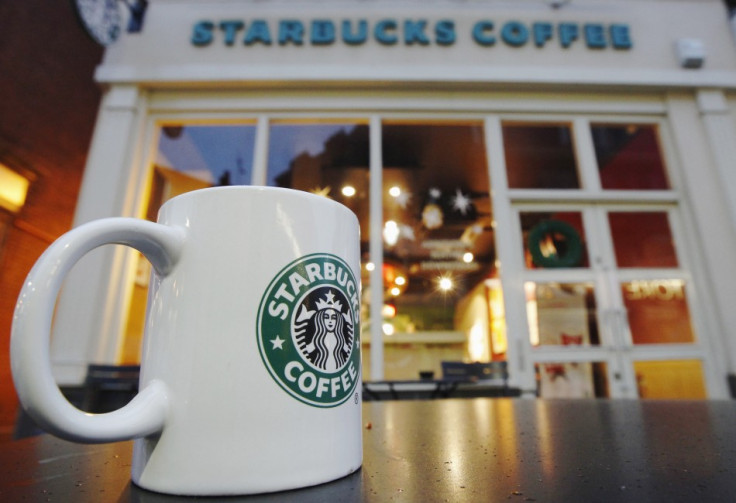Venti Sales, Skinny Taxes? Starbucks Corporate Tax Row a Complicated Brew

The coffee bean seeds are planted in Vietnam on taxable farm land.
The beans are transported to port by taxed, petrol-fuelled lorries before being shipped and insured on boats that pay taxes on fees needed to dock the vessel, insure the cargo and compensate the crew.
The beans are roasted in the Netherlands, in factories that pay taxes on the land and the energy they use and pay significant fees to the Dutch government to employ and protect the workers who do the roasting.
The roasted beans are then shipped to the United Kingdom, in much the same taxable fashion as they were shipped to the Netherlands.
The coffee is sold in shops that pay rent, which is taxable to the landlord who receives it and prepared and served with the aid of various bits of equipment (cups, espresso machines, cleaning supplies) all of which have incurred some form or another (sometimes multiple) taxes along the way.
The coffee is bought by customers using after-tax income.
Those customers also pay a value-added-tax to purchase a product some members of the government say has no valued added to it at all. If the customer sits down in the seats the company paid for (and paid tax on), he or she pays even more tax.
So, in effect, the company roasting the beans (paying tax) and shipping the beans (paying tax) and selling the coffee (paying and collecting tax) is now being targeted for boycott and accused of immorally avoiding taxes.
"You didn't brew that"
Have I missed something, or has the debate about Starbucks' alleged tax "avoidance" permanently shifted from the sublime to the ridiculous with this latest storm in a chai-tea cup?
Avoiding taxes?
Considering the very simplistic version of "bean-to-cup" journey described above, I'm going to go ahead and say Hector has been more than reasonably compensated for a transaction that he has very little to do with.
Dipping his hand in now, after the various layers of tax already associated the transaction, seems a bit excessive.
As the company rightly notes, it was responsible for the generation of at least £160m in Treasury revenue.
Now, you can argue that was paid by employees (via the 8,500 PAYE staff on the company's payroll) and customers (via a 17.5 percent VAT rate on the £1.2bn in sales) and you'd be right.
But you'd be wrong - dead wrong - to argue this cash would still fall into the taxman's lap if Starbuck's didn't exist.
Or didn't collect and administrate it.
As Barack Obama might have said: "You didn't brew that".
And that's a hugely important point, as calls this week for a Starbucks boycott began their inevitable chorus.
Support local, independent coffee shops, Britons were urged, and teach these big tax avoiders a lesson.
Interesting.
May I have a recepit, please?
Are you reasonably confident that shop is declaring all of its revenue, issuing electronic receipts and compensating HMRC accordingly?
Are you convinced the owners don't discriminate on the basis of faith, sex, race or appearance when hiring?
Are you sure the employees are trained, kept safe and not exploited? Are they paid transparently or under-the-table? Are they given time to heal from the inevitable burns they get from the espresso machines, paid holidays and maternity leave. Are they offered flexible hours and opportunities for advancement? Are they given time off to do charitable work?
I don't work for Starbucks. Never have. Likely never will. I enjoy their coffee but hold a preference for the nearest brewed-drink vendor as opposed to the best or most ubiquitous.
But the single-issue focus on a company's corporate tax bill seems to miss what I would hope is the larger, more holistic point: Starbucks is good for Britain.
It hires lots of employees and treats them well. It serves a quality product in a comfortable atmosphere. Its business tactics have indisputably improved the overall market for the nation's coffee drinkers regardless of where they buy their java.
And even its fiercest enemies conceded it follows UK tax rules - rules, it's worth noting, that were set by the very lawmakers now voicing the loudest concern for there adherence.
Caesar's been paid
The truth as I see it is clear: the net benefit that Starbucks brings to the UK far outweighs the small portion of lost tax revenue to HRMC. And that lost revenue isn't the result of corporate mendacity but rather the government's tax law complexity.
So blame "the big guys" if you must.
But doing so merely perpetuates the dangerous myth that all wealth belongs first to the government and should be 'rendered unto Caesar' as it sees fit.
Various taxmen have skimmed a portion of the value of every single cup of coffee sold in this country on every single stage of its journey. One final plunge into the pockets of the company that created the transaction in the first place is what's morally troubling.
The fair share has been paid.
© Copyright IBTimes 2025. All rights reserved.





















